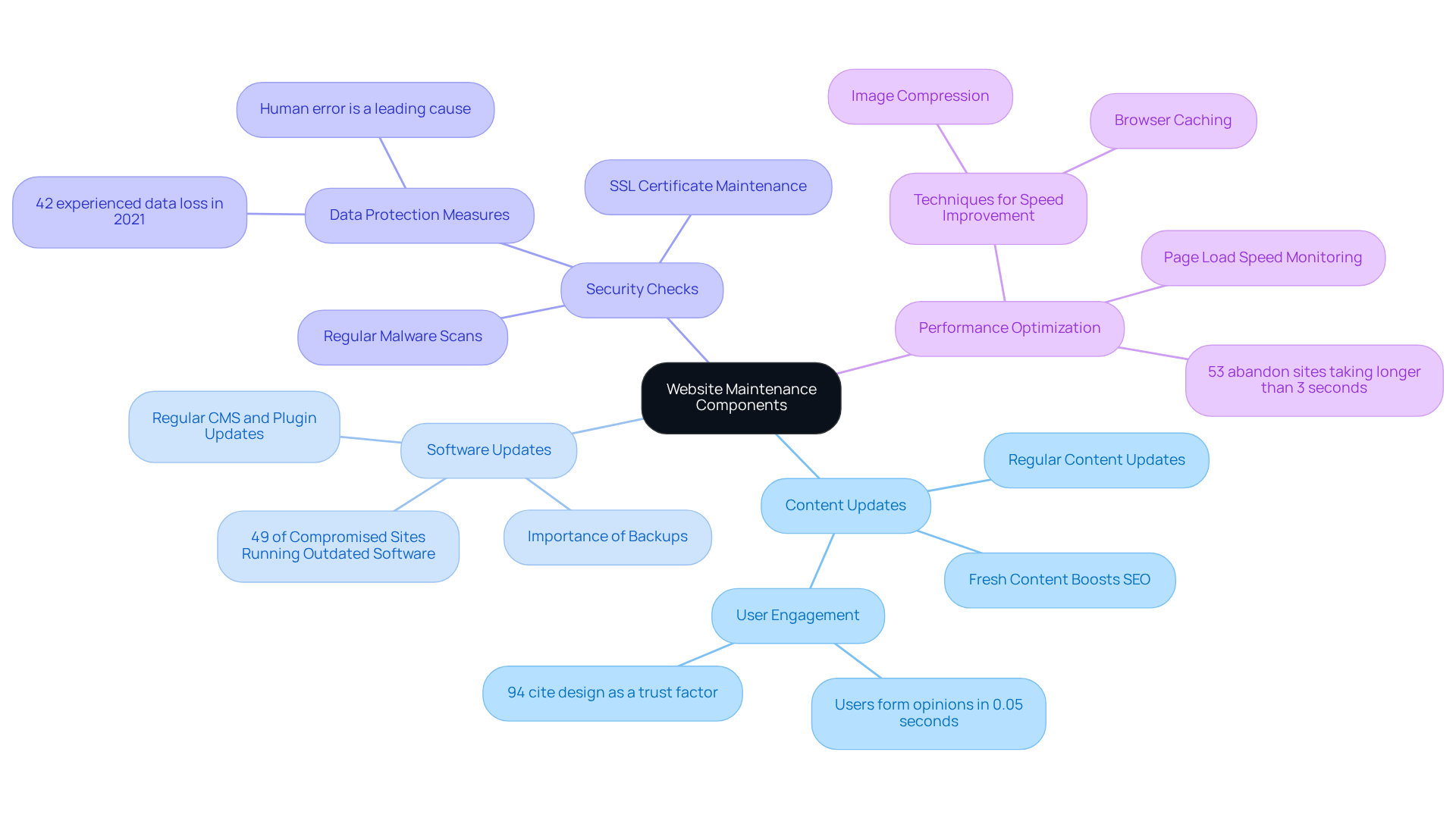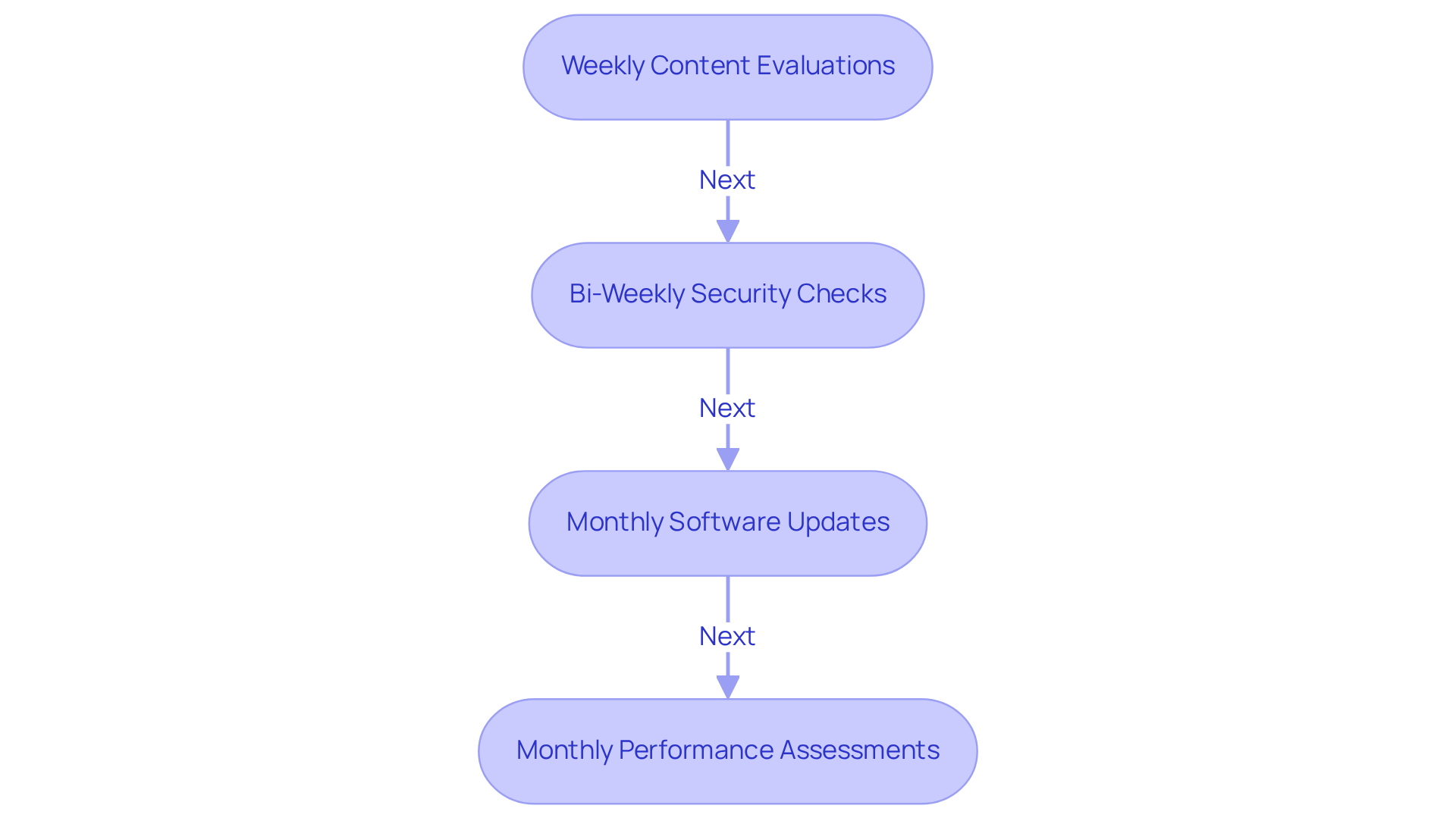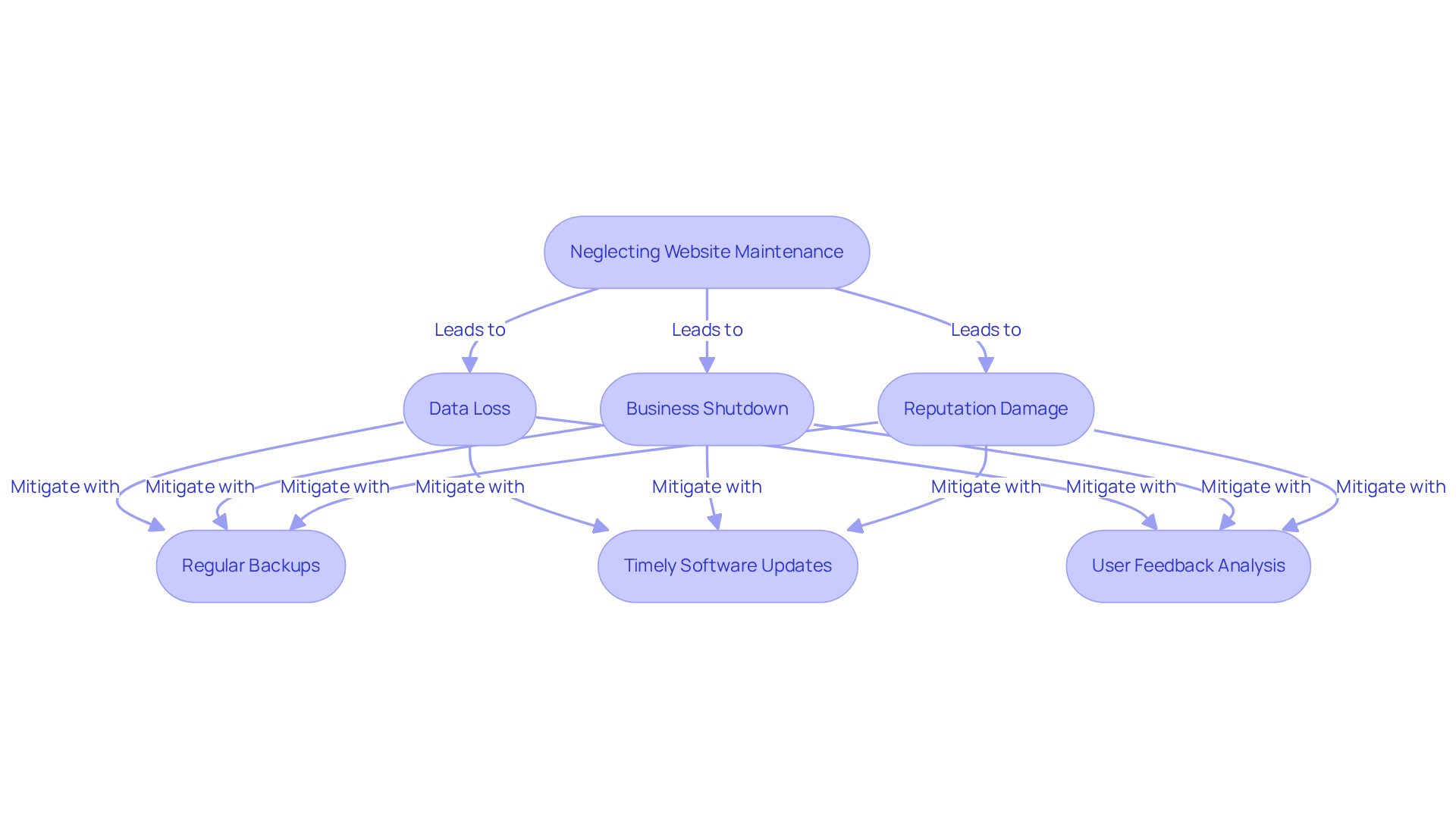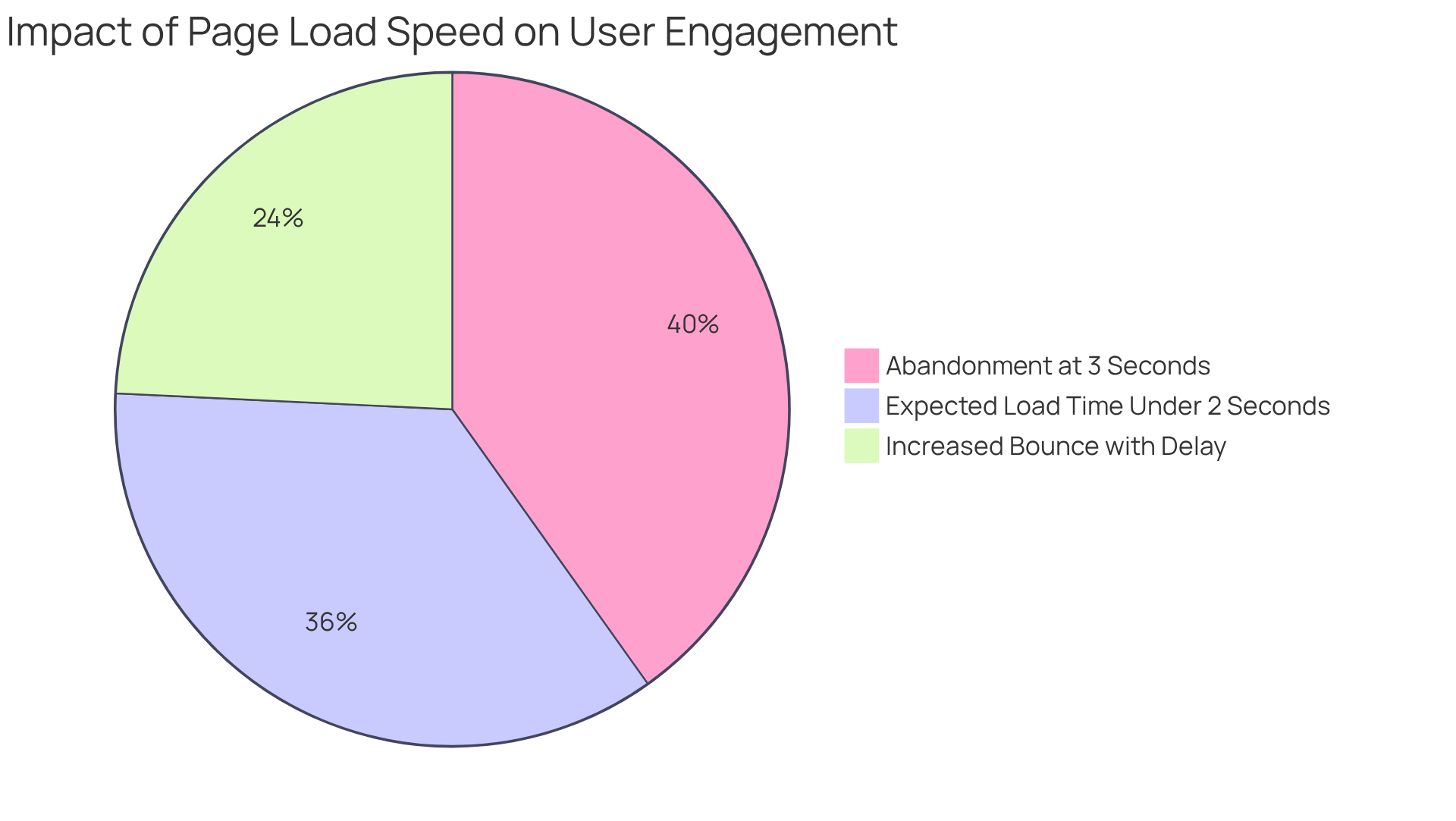Overview
Website maintenance can often feel overwhelming for tech startup founders. The challenge of keeping everything updated can lead to vulnerabilities that threaten your online presence. When content isn’t fresh, software is outdated, security is neglected, or performance isn’t optimized, it can significantly impact user experience and customer satisfaction. These issues not only frustrate your audience but can also hinder your business growth.
However, there is a supportive path forward. By committing to four essential practices—
- Regular content updates
- Timely software updates
- Security checks
- Performance optimization
you can foster a trustworthy, secure, and efficient online presence. These practices not only help prevent vulnerabilities but also enhance user experience, ultimately driving customer satisfaction and business growth. Remember, you’re not alone in this journey; embracing these steps can lead to a thriving online community that supports your startup's vision.
Introduction
In the digital landscape, a website acts as your business's virtual storefront, yet many founders may not fully appreciate the essential maintenance needed to keep it thriving. Regular updates and security checks are crucial; they not only enhance user experience but also protect against vulnerabilities that could jeopardize customer trust.
But what happens when neglect leads to outdated content and poor performance? This can create frustration and lost opportunities. It’s a situation many can relate to, where the excitement of launching a site fades into worry over its upkeep.
However, there is hope. By adopting essential practices for website maintenance, you can take a proactive approach that safeguards your online success and prevents costly pitfalls. Together, we can navigate these challenges and ensure your digital presence remains vibrant and trustworthy.
Define Essential Website Maintenance Components
In the fast-paced world of online business, many startup founders face a common challenge: . This issue can lead to outdated information, , and poor user experiences, ultimately impacting customer satisfaction and growth. It's disheartening to realize that without regular attention, your online presence can suffer significantly.
Consider how frequently you visit a site that hasn’t been updated. It can feel frustrating and untrustworthy, right? This is where the importance of [maintenance for website effectiveness](https://webstix.com/the-webstix-blog/website-maintenance-service) comes into play. Regular content updates are crucial; they ensure that your information remains current and relevant, which not only engages your audience but also boosts your search engine visibility. Fresh content signals to search engines that your site is valuable, helping to attract more visitors.
Moreover, software updates, including plugins and themes, are vital for protecting your site against vulnerabilities. Did you know that a staggering 49% of compromised sites were running outdated software at the time of infection? This statistic underscores the need for vigilance in keeping your software up to date.
Security checks are equally important. Monitoring for malware and ensuring your SSL certificates are current are essential steps in protecting your data and building trust with your customers. And let’s not overlook . A smooth user experience hinges on load times and responsiveness. In fact, 53% of visitors abandon a site if it takes longer than 3 seconds to load on mobile. For online retailers, a slow-loading site can lead to a staggering loss of $2.6 billion in sales each year.
By clearly outlining these vital components of maintenance for website effectiveness, you can develop a systematic strategy that addresses all aspects of your online presence. This proactive approach not only but also paves the way for your business's growth. Remember, taking these steps is not just about technology; it’s about nurturing your community and ensuring that every visitor feels valued and supported.

Implement Regular Maintenance Practices for Security and Performance
Establishing a schedule is essential for nurturing the of your website. Many businesses face the daunting challenge of keeping their safe and efficient. In fact, a survey reveals that 98% of companies recognize the importance of , highlighting the pressing need for . Starting with weekly content evaluations can ensure your information remains precise and relevant, which is vital for captivating your audience and enhancing SEO.
Monthly software updates should be prioritized to keep all plugins and themes current, minimizing vulnerabilities that could threaten your site. Bi-weekly are crucial, encompassing vulnerability scans and ensuring that backups are consistently performed to safeguard your data. Additionally, , including load time analysis and mobile responsiveness checks, should occur monthly to enhance user experience and satisfaction.
Utilizing tools like Google Analytics and security plugins can streamline these processes, providing valuable insights and alerts for any emerging issues. As Tim Flores wisely noted, "A total commitment is paramount to reaching the ultimate in performance," reminding us of the our digital spaces. By adhering to for website schedule, you can significantly reduce the risks of downtime and security breaches, ultimately digital presence for your business. Remember, you’re not alone in this journey; together, we can create a safer and more efficient online environment.

Avoid Common Website Maintenance Mistakes
Neglecting can result in , a challenge that many face. Imagine the stress of losing critical data due to a security breach or technical failure—this is a reality for those who fail to perform .
Alarmingly, almost 20% of businesses admit they do not back up their files at all, a decision that can lead to . In fact, 60% of businesses shut down within six months of experiencing data loss. This negligence can severely damage a company's reputation.
For instance, showed that improved customer engagement was directly linked to , including regular backups. Furthermore, neglecting software updates leaves online platforms , further compromising your hard-earned reputation. Disregarding feedback from clients can also result in a subpar experience, as essential insights that could enhance website functionality are overlooked.
To mitigate these risks, consider creating a thorough maintenance for website checklist that includes:
- Regular backups
- Timely software updates
- A strong system for
This proactive strategy not only protects your data but also fosters and enhances overall customer satisfaction. Remember, taking these steps is not just about safeguarding your business; it's about nurturing a community that values and supports its customers.

Monitor and Analyze Website Performance Metrics
Managing can feel overwhelming, especially when the stakes are high. It's frustrating to see potential customers leave your site without engaging, and this can stem from various issues, particularly around page speed and .
If you’ve noticed a on certain pages, it might be a sign that your content isn’t resonating with visitors or that the page takes too long to load. Research indicates that:
- 53% of visitors abandon pages that take longer than three seconds to appear
- 47% expect an average site to load in under two seconds
This highlights just how crucial page speed is to your success. As the refresh time increases from one second to three seconds, the likelihood of bounce rises by 32%.
By regularly reviewing these performance metrics, you can identify trends and areas for improvement, which allows for that enhances user experience and drives better results. Chris Sams wisely notes, 'To guarantee that and user engagement are balanced, owners must make certain that their pages are optimized for quick loading.'
Establishing a routine for maintenance for website performance reviews—whether monthly or quarterly—can help you stay ahead of potential issues. It's heartening to see that 43% of site owners are planning to invest in improvements to enhance . This proactive approach underscores the importance of prioritizing maintenance for website metrics in today’s digital landscape.
Remember, you’re not alone in this journey, and taking these steps can lead to .

Conclusion
Neglecting website maintenance can significantly undermine the effectiveness of your online presence, leading to outdated content, security vulnerabilities, and a poor user experience. It's a common struggle many face, and the implications can be daunting. The critical practices outlined here highlight the necessity of regular updates, security checks, and performance assessments. By committing to these essential maintenance components, you can ensure your website remains engaging, secure, and efficient.
Timely content updates are crucial for improving SEO and enhancing user engagement. Additionally, keeping your software updated is vital to protect against cyber threats. Implementing a structured maintenance schedule can help you avoid common pitfalls, such as data loss and negative user feedback. Regularly monitoring performance metrics is also essential, as it allows you to identify areas for improvement and enhance the overall user experience.
Ultimately, prioritizing website maintenance is not merely a technical obligation; it’s a strategic investment in your customer satisfaction and business growth. By adopting a proactive approach to these practices, you can foster a resilient digital presence that not only attracts visitors but also nurtures a loyal community. Embracing these maintenance strategies will pave the way for long-term success in the ever-evolving digital landscape, and together, we can navigate these challenges with confidence.
Frequently Asked Questions
Why is website maintenance important for online businesses?
Website maintenance is crucial for online businesses as it helps prevent outdated information, security vulnerabilities, and poor user experiences, which can negatively impact customer satisfaction and business growth.
How often should website content be updated?
Website content should be updated regularly to ensure that information remains current and relevant, which helps engage the audience and boosts search engine visibility.
What are the risks of not updating software on a website?
Not updating software, including plugins and themes, can lead to security vulnerabilities. Statistics show that 49% of compromised sites were running outdated software at the time of infection.
What security measures should be taken for website maintenance?
Essential security measures include monitoring for malware, ensuring SSL certificates are current, and regularly checking for any vulnerabilities to protect customer data and build trust.
How does website performance impact user experience?
Website performance significantly impacts user experience, as 53% of visitors abandon a site that takes longer than 3 seconds to load on mobile. Slow-loading sites can lead to significant financial losses for online retailers.
What is the benefit of having a systematic strategy for website maintenance?
A systematic strategy for website maintenance addresses all aspects of an online presence, enhancing customer satisfaction and paving the way for business growth. It ensures that every visitor feels valued and supported.




